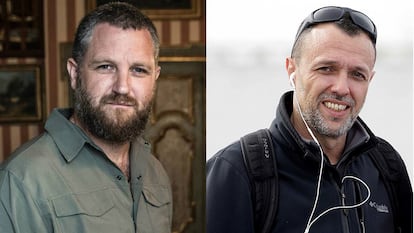Two Spanish journalists killed in Burkina Faso attack
An Irish national and a local man also died after armed individuals on motorbikes attacked a convoy in the east of the conflict-stricken African country

Two Spanish journalists who went missing in Burkina Faso after their convoy was attacked in the east of the country on Monday have died, Foreign Minister Arancha González Laya announced on Tuesday at a press conference following the weekly Cabinet meeting.
The victims have been identified as David Beriain and Roberto Fraile. Shortly before 4pm on Tuesday, Prime Minister Pedro Sánchez confirmed the news in a Twitter message and sent condolences to the families.
“The worst news has been confirmed. Our hearts go out to the families and loved ones of David Beriain and Roberto Fraile, assassinated in Burkina Faso. We salute those who, like them, do courageous, essential reporting from conflict zones,” he wrote.
Se confirma la peor de las noticias. Todo el cariño para los familiares y allegados de David Beriain y Roberto Fraile, asesinados en Burkina Faso. Y nuestro reconocimiento a quienes, como ellos, realizan a diario un periodismo valiente y esencial desde las zonas de conflicto.
— Pedro Sánchez (@sanchezcastejon) April 27, 2021
Local sources cited by Agence France Presse reported that two other people, an Irish national and a man from Burkina Faso, have also disappeared and that at least three people were wounded in the attack.
The incident took place on Monday at around 9am, on the road joining Fada N’Gourma and Pama. The reporters were in the area, located near Arli National Park, to shoot a documentary on the government’s fight against poachers. The convoy was made up of two pick-up trucks and around 20 motorbikes, on which journalists, environmental agents and a military escort were traveling. The convoy left Natiaboani in the morning and stopped around 60 kilometers later. The Spanish journalists got out of one of the trucks and started operating a drone to take aerial photos when the attack began.
Armed men arrived on two trucks and a dozen motorbikes, prompting the convoy to disperse, according to security sources. Several members of the escort and a foreign national who was wounded managed to reach Natiaboani, while four people – the two Spaniards, the Irish citizen and the local man – disappeared.
The Spanish Embassy in Mali has been in touch with the families of the two victims. “This is a dangerous area, regularly used by terrorist groups and bandits,” said the minister González Laya. The head of the organization Reporters Without Borders also issued a message on Twitter.
We have learned from official sources in #burkinaFaso that three journalists (including two Spanish reporters) who were investigating poaching were killed in an attack in the east of the country yesterday. This tragedy confirms the great dangers reporters face in the Sahel region
— Christophe Deloire (@cdeloire) April 27, 2021
In recent years, Burkina Faso has been one of the countries worst affected by jihadist violence in the Sahel region. Since the first attacks took place in 2015, there have been around 5,000 victims, half of them in 2020 according to data from the non-profit group Acled. More than a million have been internally displaced.
The last violent incident involving a Spanish national in Burkina Faso took place on February 15, 2019, when the missionary Antonio César Fernández Fernández was killed by a group of jihadists who had attacked the customs post in Nohao, in the south of the country. The Spaniard was returning to his home in Ouagadougou after having participated in an event in Lomé, the capital of Togo.
English version by Simon Hunter.
Tu suscripción se está usando en otro dispositivo
¿Quieres añadir otro usuario a tu suscripción?
Si continúas leyendo en este dispositivo, no se podrá leer en el otro.
FlechaTu suscripción se está usando en otro dispositivo y solo puedes acceder a EL PAÍS desde un dispositivo a la vez.
Si quieres compartir tu cuenta, cambia tu suscripción a la modalidad Premium, así podrás añadir otro usuario. Cada uno accederá con su propia cuenta de email, lo que os permitirá personalizar vuestra experiencia en EL PAÍS.
¿Tienes una suscripción de empresa? Accede aquí para contratar más cuentas.
En el caso de no saber quién está usando tu cuenta, te recomendamos cambiar tu contraseña aquí.
Si decides continuar compartiendo tu cuenta, este mensaje se mostrará en tu dispositivo y en el de la otra persona que está usando tu cuenta de forma indefinida, afectando a tu experiencia de lectura. Puedes consultar aquí los términos y condiciones de la suscripción digital.









































